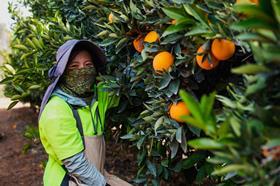
Vietnam has become the first county to join the new Australian Agricultural Visa Programme after the two countries signed a memorandum of understanding (MoU).
The new visa programme has been offered to residents from countries in the Association of South-East Asian Nations (Asean). It was brought in to replace British backpackers who will no longer be required to complete farm work as part of their visa requirements due to the new UK-Australia FTA.
The news Vietnam signed the first bilateral MoU under the programme has been welcomed by the Australian horticultural industry, which is still facing labour shortages as a result of Covid-19.
Michael Rogers, chief executive of the Australian Fresh Produce Alliance, said the visa would complement existing initiatives to recruit Australians, and the Pacific Mobility programme.
“As some of the largest employers in the horticulture sector, AFPA members have been working towards developing a productive and returning harvest workforce. Workers from Vietnam participating in the ag visa programme will form an important part of this future workforce,” said Rogers.
“Importantly, the ag visa will be critical to both allowing the industry to develop a productive and returning workforce and restructuring the sector’s harvest workforce. We are very clear in how the ag visa fits within the horticulture industry’s employment options - that is specifically targeting seasonal harvest work peaks. This perfectly complements the ongoing employment of Australians, Pacific workers and other skilled migration pathways available.'
Ausveg chief executive Michael Coote said the visa was a long-term structural solution for the industry, allowing it access a more efficient and effective workforce, reducing its reliance on working holiday makers.
“It is a fantastic development to see that Vietnam has agreed to sign up to the ag visa. I thank the Australian and Vietnamese governments for this significant announcement, which is welcome news for the Australian vegetable and potato industry,” said Coote.
“This latest development demonstrates that the ag visa is progressing well and will be able to provide another avenue for Australian growers to access the workers that they need to plant, harvest and pack produce for local and international markets.”



